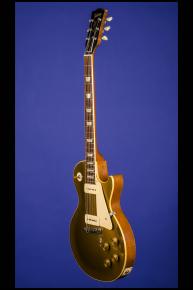"The Ultimate Blues Machine"
An All Original and Exceptionally Fine 1953 Les Paul GoldTop
1953 Gibson Les Paul Standard Gold Top
This totally original Les Paul Standard Gold Top weighs just 8.20 lbs. and has nice, fat nut width of 1 11/16 inches and a standard Gibson scale length of 24 3/4 inches. Solid mahogany body with a solid carved maple top. One-piece mahogany neck with a wonderful thick profile. Rosewood fretboard with 22 original thin frets and inlaid pearl trapezoid (crown) position markers. The top of the guitar has single cream binding and the fretboard has single cream binding. Headstock with inlaid pearl "Gibson" logo and with "Les Paul Model" silk-screened in gold. Two-layer (black on white) plastic truss-rod cover. Individual single-line "no-name" Kluson Deluxe tuners with single-ring tulip-shaped Keystone plastic buttons (stamped on the inside "2356766 PAT APPLD."). Serial number “3 1995” inked-on in black on the back of the headstock. Two P-90 pickups with outputs of 7.22k and 7.14k. Cream plastic pickup covers (with no stamping on the underside). Single-layer cream-colored plastic pickguard. Four controls (two volume, two tone) on lower treble bout plus three-way pickup selector switch (with original Catalin switch-tip) on upper bass bout. Gold plastic (half-inch tall) barrel-shaped "Speed" knobs. The potentiometers are stamped "134 320" (Centralab, May 1953) and the two original capacitors are the "Grey Tiger Type GT 452 .02 MFD 400 VDC." Combination "wrap-over" bar bridge/stud tailpiece. There are a few small 'pick' marks between the picks on the bass side and a few small and insignificant surface marks on the top. There is some belt buckle 'scarring' on the back - but very little actually through the finish. There is some light edge wear on the back edges and a few small surface marks on the sides. The original frets show almost no signs of wear as does the fretboard. This is one of the cleanest examples of 'The Ultimate Blues Machine' that we have handled and is in very strong exceptionally fine (9.00) condition. Housed in the original "Stone Case Co." Gibson four-latch, shaped brown hardshell case with pink plush lining (8.75). Complete with the original Gibson tan leather guitar strap, the original Gibson black guitar cord, some original Gibson Mona-Steel guitar strings in original box, an original Gibson Les Paul & Mary Ford cutting from an early fifties magazine and an original receipt for this guitar [and a Fender Deluxe Amplifier] dated "April 25, 1967."
"Finishing the maple top was a completely different process than that for mahogany. Due to the smooth nature of the dense maple, the wood didn't need a filler coating, but needed to be properly prepped. The tops received a few initial, thinned-out lacquer sealer coats that were lightly sanded and readied for the final finish. "On the Goldtop, they would put what they called a sealer on it," states Gibson's Aaron Porter, "which was just thin lacquer kind of thinned out. They put maybe two coats and then sanded it. They made sure there wasn't any pits or anything on there because it would show up underneath in the gold. If there was a scratch or groove, it would show right up. The gold lacquer mixture was then sprayed once or twice to make sure it was well covered." The bronze powder was pre-mixed into the clear nitrocellulose lacquer for these classic models. The paint department soon discovered that the brass filings in the mixture were quite obtrusive… Seeing how the oxidation of bronze turns green, often worn and weather-checked instruments show green in the lines, adhered to the prep coats, and also in some of the sealing topcoats. Unfortunately, the bronze/gold color under the finish didn't stand up too well to the rigors of constant use, it would often pit or become somewhat rough on the necks and top edges." (Rob Lawrence. The Early Years of the Les Paul Legacy, p.68).
Many guitarists consider this to be the ultimate "blues machine" -- the sustain on this guitar is quite unbelievable!
"The first Gibson Les Paul solidbody electric guitar, known simply as the Les Paul Model then but now better known by its descriptive nickname 'gold-top', first went on sale during 1952" (Tony Bacon, 50 Years of the Gibson Les Paul, p. 15).
"The new Les Paul guitar was launched by Gibson in 1952, in the summer, priced at $210, which was about $20 more than Fender' Telecaster sold for at the time…Today, a gold-finish Les Paul model is nearly always called a gold-top thanks to its gold body face…The new gold-top's solid body cleverly combined a carved maple top bonded to a mahogany base, a sandwich that united the darker tonality of mahogany with the brighter sonic 'edge' of maple. Paul said that the gold colour of the original Les Paul model was his idea. 'Gold means rich,' he said, 'expensive, the best, superb'" (Tony Bacon, 50 Years of the Gibson Les Paul, pp. 20-21).
"In 1955 the gold-top gained Gibson's new Tune-o-matic bridge. The unit had the facility to adjust individual string-length, improving intonation. Two years later humbucking pickups replaced P90s on the gold-top" (Tony Bacon and Paul Day, The Gibson Les Paul Book, p. 19). This guitar is one of the last Les Paul Standard Gold Tops with "wrap-over" bar bridge/stud tailpiece before the Tune-O-Matic bridge was introduced in late 1955.



















